Ellen and Jim Have a Blog, Too
We are two part-time academics. Ellen teaches in the English department and Jim in the IT program at George Mason University.


Pallisers 5:9: Strained and Broken Relationships (2) · 11 March 08
Dear Harriet,
Yesterday I wrote my first letter on this part: a discussion of the language patterns, theme of time, and use of light, dark and colors in Pallisers 5:9: “Time is pressing us all very hard, Mr Finn (1). Today, the second letter: a thematic summary.
As I wrote yesterday, Parts 4:7 and 4:8 show us Phineas Finn (Donal McCann) and Lady Laura Kennedy (Anna Massey) as beginners and then in the thick of life, with the accent on politics in the parliamentary sense and getting ahead in life through joining the right group and marrying the right person: we see Phineas the climber, and Lady Laura ambitious to be influential in politics, but thwarted by a lack of money she herself has given away to her brother; then fights over legislation, in this case, the secret ballot, networking and conflicts between groups of men. Phineas is an outsider slowly gaining acceptance and making mistakes: here he is contrasted to Madame Max (Barbara Murray), slightly a pariah as a woman lives on and by herself; she has learned how much mistakes can cost her, and appears chorally or as the sophisticated counterpart to Phineas’s other neglected Love, Mary Flood Jones (Maire Ni Ghrainn). We have Phineas equated with Mr Bunce (John Haydn) but able to bribe Bunce out of jail with ease (just the opposite happens in Trollope’s novels; that is, it takes a long time to free Mr Bunce and it’s not done sheerly by rank or through upper class cliquing). Politics shapes private life is clearly there.
5:9 reverses the perspective. Now we see how private life, specifically here through love stories, dominates people’s existence, and permits them to achieve in public life.
There are two overarching central stories moving in tandem: we see Phineas in pursuit of Violet Effingham; while he professes love to her, he seems as emotionally (if not more) involved with Lady Laura Kennedy, and he apparently thinks nothing of having sex with Mary Flood Jones while in pursuit of Violet. He turns to Madame Max Goesler for solace, advice, supportive loyal friendship. We are given many signs to show Phineas does not begin to know himself; and while he has as much right as Chiltern to pursue Violet, he does it for advancement, because Violet is so presentable, well-connected (though those she’s connected to will turn on him at first if not permanently), and will solve his problem about money. If he marries her, he won’t need Lord Brentford. Phineas chases Violet somewhat relentlessly. Well, as relentlessly as short scenes moving swiftly allow.
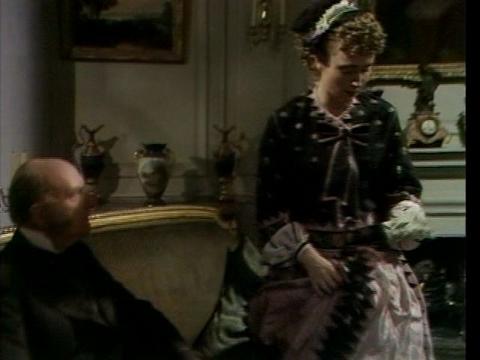
Violet Effingham (Mel Martin) disquieted by the way Lord Brentford (Lockwood West) and Phineas (Donal McCann) discussing Lord Chiltern (John Hallam)
Mel Martin’s Violet is not Trollope’s proto-feminist; she is less in love with Chiltern, a more virginal spirit allured by the courteously aggressive man.
Phineas is climbing upwards but his path is strewn with obstacles. Some are the result of his love pursuits: once Clarkson is paid off by Aspasia Fitzgibbon, Quintus Slide appears again in Phineas’s lodgings: Slide wants to stand for Lord Brentford’s rotten borough (but that’s Phineas’s, the great reformer). Phineas tears up the smear sheet Slide shows him—about Phineas’s relationship with Lady Laura—as one he’s prepared to publish in the paper if Phineas doesn’t yield. Tough open pressure. The world works more insidiously and by indirection, but a film must move quickly so what lies latent is brought to the surface.
Phineas’s relationship with Chiltern also breaks down. Chiltern bursts into Phineas’s room, with with a menacing cane: he will not allow another man to have Violet even if she refuses him, and he will attempt to kill Phineas rather than let Phineas become Violet’s lover. Phineas thought he did the right and honorable thing to inform Chiltern now that Violet has refused Chiltern several times, he will himself court her. He stretches out a hand of friendship to Chiltern:
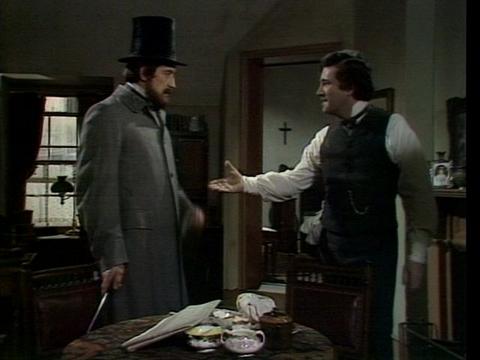
Phineas glad to see Chiltern (John Hallam) in the first moments of their last interview in the part
In response, Chiltern hits Mrs Bunce’s table fiercely with his cane, and insists that Phineas “withdraw” his intended proposal of a pursuit of Violet, or he, Chiltern, will retaliate in whatever way he can
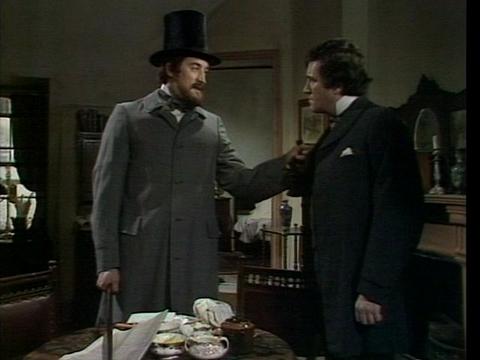
Phineas also has a perpetual basic problem: he has no solid money to live on (a reason for his pursuit of Violet who is an enormously rich heiress). One still here: Phineas suddenly hoarsely asking Mr Clarkson to spare him as if he had the money Fitzgibbon owes (the irony throughout is Phineas has had nothing), he would pay:
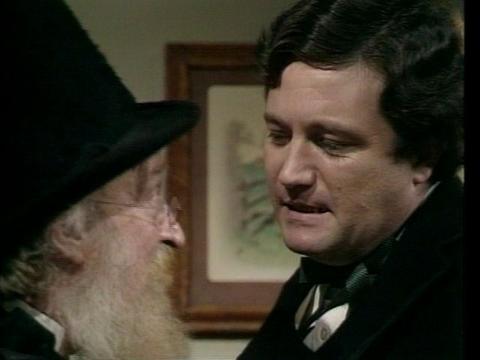
Phineas telling Mr Clarkson (Sidney Bromley) that he would pay Mr Clarkson if he had the money; he doesn’t.
Phineas is asking for mercy as an election is coming on; would Mr Clarkson give him more time to pay. Mr Clarkson refuses. The sheriff will be there soon to arrest Phineas.
Trollope says in An Eye for an Eye, “great and terrible is the power of money,” and in Raven’s fiction money is made a pivotal force for corruption, betrayal, life’s few gratifications.
Contrasting to this movement, activity, and if checkered, nonetheless ever upward career, is the story of Lady Laura Kennedy. Lady Laura and Kennedy’s story is extraordinarily well done. The dark colors, the sense of Scotland outside all beauty, and prison inside for Lady Laura (which I showed in yesterday’s letter). Laura fights him because she is resisting destruction of her very self. Massey is superb as the woman who says she is “bruised and fallen,” and shows us the customs of her society give her no second chance.
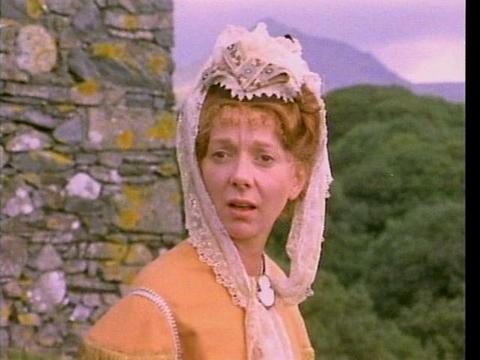
Laura Kennedy (Anna Massey) telling Phineas, living a life that’s worth while to her is over for her
As the camera focuses on the Kennedys (her so still), and she repeats she has a headache and he wants to call the doctor (straight from Trollope this dialogue), she says when will you not realize Robert women don’t want to be bothered, he echoes the line bitterly and now (unlike Trollope where the connection is not so explicit) it means she won’t have sex with him.
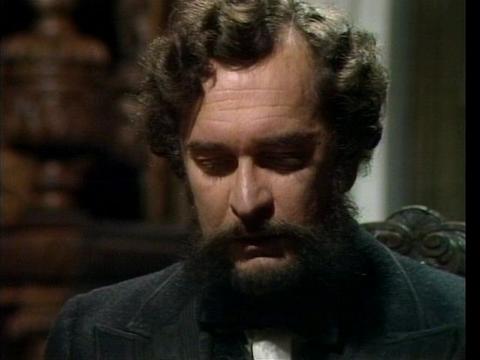
Kennedy (Derek Godfrey) referring to his sexual frustration; Raven and the actor present Kennedy far more sympathetically than Trollope
But Kennedy has his weapons & can get back. She suddenly spits out anguishedly, cannot I go to my father, and the answer is no; he has the right to forbid her. He then spews out his poison, that she has had everything and what does he have? What does he want? is it just sex? He is hounding her father for her dowry because he has not had from Lady Laura what he wanted and it’s more than sex. She won’t be religious, she won’t worship him. He says she married him to be able to politic.
In Trollope’s novel Kennedy never says anything so explicit; he seems more dense or obtuse and the narrator informs us of these subtleties. In a film there is no narrator to supply this, and here it’s used to embitter the conversation. Late in 5:9 (the concluding political reception given by Lady Glen), we hear how Kennedy would not let Lady Laura come to the opening of parliament and we are left knowing nothing more.
Interestingly, this is the first episode where the character begin to age visibly: each of the actors has been made up to look older. Susan Hampshire’s face is now more angular, and we see lines. Plantagenet is aging; so too Lady Laura Kennedy, all of them are presented as weary and looking older either through clothes, make up or gesture. The blonde child who represented Planty as a baby just about to walk, is now a 3 year old in baby shoes. This is in accord with Trollope’s purpose and Trollope is unusual for registering such a thing. Mostly the fantasies around recurring characters also have them ageless. Trollope did it over 6 books; Raven and David suddenly from the 8th to the 9th episode. But it fits the jaundiced feel seeping through the episode.
For about 3 episodes now, Lady Glen has appeared to be contented hen: ever pregnant (and it’s presented as ever so easy and wonderful), all smiles, quite the complacent networker (now she worries or frets at Plantagenet for wanting to get back to “work,” which for him is reading, studying, coming up with adequate legislation), her whole existence given over to play with the darling (necessarily) blonde blue-eyed boy. Suddenly we have a scene which throws us back to their original incompatibility. When Palliser attempts in his stiff-necked mortification and jealousy to stop her playing on the floor with her son, bullies her, she bursts out she would not be with him but because it was her duty to be his breed cow, and asserts again they do not love one another; she retracts it in order to make peace and a viable relationship upon terms of partnership and pity.
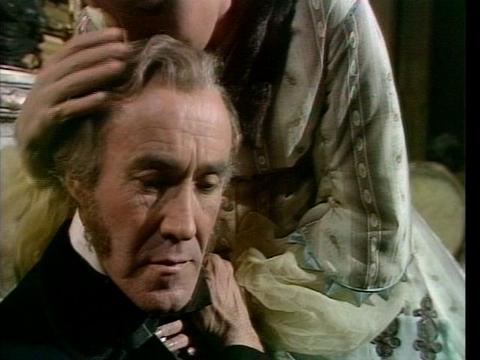
Plantagenet (Philip Latham) and Lady Glencora (Susan Hampshire) comforting one another.
That Lady can come over to him, and apologize, and say she didn’t mean it, and in response he can put his hand on hers is the sign they can and will adjust to their lot, their lives, together
The part is taken up just about wholly with different forms of strained as well as broken relationships. Phineas has enough integrity to write Chiltern (as he does in the novel) that he is going to court and try to marry Violet. Chiltern’s response is feel he has been betrayed because he and Phineas were friends. Admittedly this is potentially far more than strain: a duel is a way of murdering someone, and as this episode ends Phineas is headed for Belgium to be murdered or murder for all we know. We are not exactly to admire Phineas here for we have seen how he is treating Mary Floyd Jones. But Trollope does not blame the two men, and both he and Raven show them becoming friends once again once the duel is passed. Raven also shows how others can react superciliously and allow this sort of thing simply to go on instead of being horrified & trying to stop it. Thus Raven brings in Dolly Longestaffe at the conclusion of the episode to in ironic ominous terms pronounce the coming duel “an assignation … romantic enough … in its way.”
The relationships kept up are those based on strong compromise. Lady Glencora and Plantagenet. He is beginning to learn not to try to control her & to appreciate her form of politicking: when she says at the close of the episode she has invited Madame Max to her party and wants to be friends, to his objection he doesn’t know if his wife should associate with her, she says a friendship will enable her to watch over Madame and the Duke and influence the outcome; she is learning to maneuver around him and create the pleasures she enjoys. Aspasia Fitzgibbon and Laurence her brother: she likes her function; she remains unmarried and not beholden to anyone (she is in this a parallel to Madame Max), and can look down on hopeless men. Phineas and Laurence who comes to apologize; there will be no more borrowing, but Phineas finds Fitzgibbon is the man he can turn to to tell of his real motives as to be his second in the coming duel with Chiltern. Fitzgibbon doesn’t judge others (lest he be judged).
These intensely passionate scenes are punctuated twice by quiet idylls and in both Madame Max features. In one we see her with the Duke and in the other with Phineas. We are persuaded of the loneliness Lady Glen attributes to Madame Max by her face as she says to the duke (for exmaple, she wants nothing from the him “but the pleasure of your company” (1:3), to be told “all men can be greedy on occasions;” but her make-up and costumes (the sombre colors Trollope dressed her in too), reinforce the point. Here she is in her first moment with Palliser in the series, an important one as she will be the last lady left standing with Palliser in the final part when he finds himself alone, apart from his grown children. Lady Glen has insisted he make friends, and Madame Max offers up more than an apparent appreciation of the details of decimal coinage; she shows knowledge of the subject:
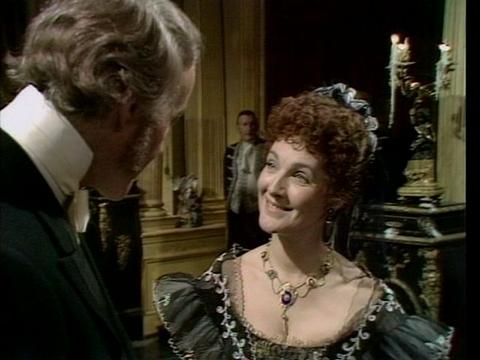
Madame Max (Barbara Murray) showing a generosity of spirit and kindness as she begins to discuss decimal coinage
Plantagenet hasn’t looked quite this alert since Griselda, Lady Dumbello, evinced a dumb interest:
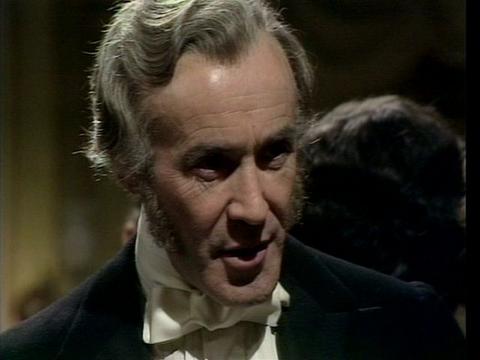
Plantagenet’s face opens up
This is not to say that sheer parliamentary and economic politics are forgotten. Towards the end of the episode when Lady Glen holds another salon, and we have another of these large scenes of characters gathered together where the camera moves from group to pair to group, we do see Monk (Bryan Pringle) again; Barrington Erle; Bungay (Roger Livesey) talking away about the next move in politics, and an election to come. So the political material is brought back in toward the end for its own sake and may be developed more in Episode 10.
Sylvia
--
Posted by: Ellen
* * *
Comment
- While discussing the films on Trollope-l, we have been reading Trollope’s Phineas Finn, and I thought the thread on Trollope’s sympathy for Chiltern relates to this blog:
Nick Hay wrote:
“Obviously they are very important to Trollope’s conceptions of masculinity. I thought I would take a little time to compare this one (Chapter 24) and that from CYFH, and what is revealed in them about the characters of Chiltern and George Vavasour respectively.
In CYFH George’s mode of hunting is presented as somehow suspect, tricksy, clever. He plans his hunting so that he is ‘in at the kill’ and is thereby shown to good advantage (and can show his horse to good advantage). He benefits from having a wily groom. He is always calculating. Now on the surface George is a successful hunter, but it is clear that Trollope does not approve of this
mode of hunting.
In PF Chiltern is quite different. All he wants is to ride hell-for-leather and push himself and his horse to the limits. Which is exactly what he does here, ending up in him injuring himself and killing his horse. There is not an ounce of sympathy for the horse which is condemned to a horrible and painful death (it is left in the ditch with a broken shoulder until someone arrives to shoot it). Now it is possible to say that the modern reaction to this callousness is a matter of autre temps. But the endorsement of Chiltern’s actions offer us a view of Trollope’s vision of commendable masculinity. Chiltern’s behaviour, his mode of hunting, is approved of.
Not perhaps wholly. It may be objected that Trollope’s identification is with Phineas himself (clinging to his horse and hoping for the best!). But certainly in comparison with George Vavasour’s mode of hunting, Chiltern’s is approved of and considered properly masculine. Better to ride recklessly and kill your horse, than to be clever and show yourself to the best advantage. Chiltern is a proper hunter and therefore a proper man. He is of course properly stoic about his own wounds and Phineas is properly admiring of this. Really this is all rather basic as Trollope’s hunting scenes go – how much funnier, because ironic, is that in Orley Farm where Peregrine comes off the worse because he is not injured – when he had suspected that his equestrian prowess would expose Felix, in fact Felix gains a massive advantage from being injured. Here in PF however Chiltern is shown as a masculine hero both by being a reckless rider and stoic as to his injuries.
I believe I hardly need to say that I find this definition of masculinity offensive and absurd; my point is how Trollope uses his hunting sequences to develop such definitions in the particular hunting modes of his protagonists.
Nick”
— Elinor Mar 11, 5:57am # - Leslie replied:
“Hello, all. I am almost caught up with my reading of Phineas Finn (I’m in chp 44) and am now trying to catch up on all the interesting posts. I simply had to chime in with an emphatic “me too!” to Nick’s dislike of Chiltern.
When we are first introduced to him in chp 11, we are told that he beat a man to death “with his fists.” Trollope attempts to mitigate the seriousness of the act by telling us that,contrary to public report, “the attack had been made on him, that he had not been to blame, and that he had not been drunk,” and he certainly had not been in a fit of the DTs (chp 11, p 137). “The worst of that affair,” Trollope tells us, “was that it produced the total estrangement which now existed between Lord Brentford and his son” (137). No, the worst of the affair is that he beat a man to death in a rage. We are to think that he is more sinned against than sinning, as the saying goes. But he doesn’t do much to improve his position other than go after Violet. We are told repeatedly (I can’t find any good examples just now as I leaf through the book, but I know they’re there) that the chief problem with him is that he is idle, and he is full of tremendous energies that have no outlet in his idleness.
So, my answer would be, stop being so idle. Find something useful to do. But he just sulks that his father has been unjust to him and people believe the worst of him and does absolutely nothing to occupy himself in any good or useful (to himself or others) way. He just fills the time in, mostly with hunting. Talk about the unspeakable in pursuit of the inedible!
I know Trollope wants us to admire his manliness and sometimes I do like his contrariness and unwillingness to go along with pious social idiocies (Ellen has pointed some of these out in another post), but in the end I can’t get past this passage, which is important because it is part of that first introduction to Chiltern we are offered in chp 11: “Lord Chiltern’s hand was like the hand of any other man, but there was something in his eye that almost frightened her [Violet]. It looked as though he would not hesitate to wring his wife’s neck round, if ever he should be brought to threaten to do so” (140).
Leslie”
— Elinor Mar 11, 5:59am # - I replied as follows:
“Depiction of Lady Laura and Lady Glen in the films : collusive victims of patriarchy, the tragic figure and the trapped one.
Dear Leslie and all,
I’m delighted Leslie is catching up to us—if only because then she has been reading this marvelous book, but she goes farther than that and endorses Nick’s view that Chiltern is unacceptable, a portrait intended to make us admire a violent, indeed murderous man who does nothing useful, and who feeds into the conception in Trollope’s novels (and Raven’s films too) that women love violent men, are masochistic. I have nothing to say against this except what I already suggested (I thank Leslie most sincerely for bringing this out too) that Chiltern is also seen as utterly sincere, a man of honesty whose word can be trusted; he is not for sale, not for rent.
Trollope saw the lack of performative ways as part of honesty. He does have portraits of men who are honest and not violent or reluctantly violent (Grey), but he buys into the myth women as a group admire violence and fall in love with it. This idea flatters and upholds a patriarchal order run by violence in men. And Trollope himself is threatened by any cracks in the male hegemonic order.
I found the depiction of this in Caroline Mortimer as Alice Vavasour practically salivating over Grey when she learns of his physical struggle with George Vavasour revolting.
On the other hand, I find myself at moments liking Chiltern because Trollope has so shaped his character otherwise that he seems an enjoyable, non-pressuring (to all but the woman he wants to make “his”) witty ironic and intelligent man. He has my sympathy in his lack of ambition for public “glory.”
As Laura’s husband, Phineas’s patron for a while and then his maddened enemy, Kennedy is an important character and he’s given more clear justiciation in Raven than Trollope. In Raven it’s clear Lady Laura is withholding sex, refusing to have sex with Kennedy: he says Laura will not “love” him. In the films she seems far more to have simply married for vicarious power and to pay her brother’s debts. I found the juxtaposition of Lady Laura’s with Lady Glen’s scene with Plantagenet where he forbids her to play with Planty on the floor as it rouses his jealousy and threatens his sense of his dignity very compelling.
I’m glad to say a good word for Raven, to suggest (great heresy) he can improve on Trollope. In Raven’s films Lady Glen and Lady Laura are collusive victims of male hegemony; we are shown how deeply following the male patriarchy maims and destoys their innermost being both, Lady Laura more obviously than Lady Glen for most of the time Plantagenet has his rigid persona in check.
I should also have said Palliser seems to have genuine affection for Lady Glen, include her in his public life, and not try to control her and use her in the way of Kennedy. Nonetheless, she feels used and cut off from some deeper roots of happiness. Lady Laura is the tragic frustrated figure and Lady Glen the trapped one.
There are some remarkable and penetrating scenes in Pallisers 5:9, either wholly invented by Raven or partly semi-original.
This time through I also finally saw that there is a textual basis for the Arcadian scenes at a huge pastoral garden area which punctuate the shifts from major novel to major novel in Raven’s Pallisers. When the Duke invites everyone to Horns (including Madame Max) with Lady Glen as his hostess, the description of the place and activities corresponds to what we see in the opening of the Pallisers, the Christening when Phineas first meets the powerful Palliser clique, and again when Lizzie Eustace is first introduced to us and the Duke. Raven took this scene more than half-way through Phineas Finn and made it a major symbolic motif in his series which is a heritage film one.
Ellen”
— Elinor Mar 11, 6:02am # - A little more on Madame Max:
“Listening to Trollope’s early chapters introducing Madame Max, her refusal of the Duke’s proposition to be his mistress, and then offer of marriage, interwoven with her conversations with the dense Mr Finn, I see more than a few hints Trollope was playing with the idea of having his hero have an affair with Madame Max, but somewhere orother (no evidence left of this as how could there be) along the way decided against it, as he thought it would endanger his sales and hurt the reputation of this secondary heroine for the series. He then gradually began to change his presentation of her, making her less exotic, more conventional in background, dismissing the second husband (a remittance man), so that in the end all he can do is present her as offering Phineas sheer money. The series does the same; they can see their way to making Mary Flood Jones pregnant as that makes Phineas’s decision to return to Ireland more probable, plausible, and sympathetic (to women at any rate—or so I fondly imagine), but not to present a genuine radical woman of independent
means, enjoying her sexual life too.
A real contrast to Lady Glen and Lady Laura, one that would have been worth making.
E.M.
— Elinor Mar 11, 6:13am # - Someone suggested I say the relationships are also treacherous. Potentially yes.
E.M.
— Elinor Mar 11, 6:42am #
commenting closed for this article
